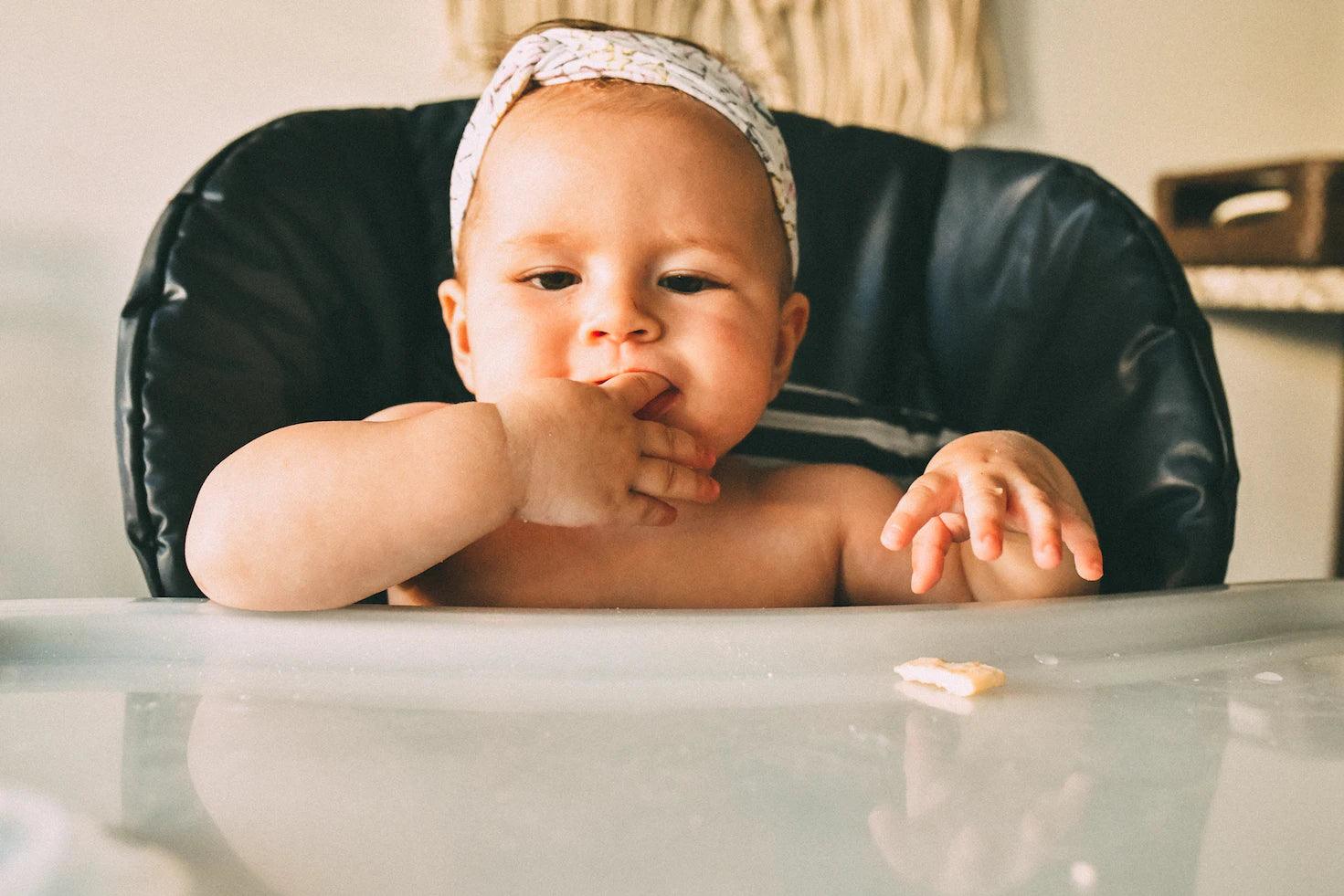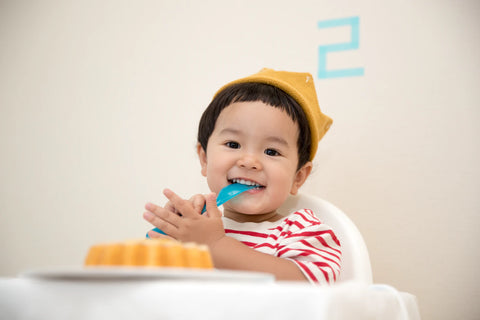Teething in Babies: Six Ways to Relieve Discomfort
•Posted on August 17 2022

Teething can be a painful event for babies. As parents, how do we scientifically deal with the discomfort of teething and the subsequent brushing of your baby's teeth after teething. Read this article to help you and your baby get through the teething period with ease.
Table of content:
- When does your baby start teething?
- The order of baby teething.
- Signs of teething and how to deal with it.
- Teeth care for babies of different ages.
When does your baby start teething?
I believe there are many parents who are concerned about this issue. The timing of teething is determined by genetics and growth and development, so each baby is different. The timing of teething varies from baby to baby, so don't judge your child's teething by whether it is normal or not.
Medically speaking, it is considered normal to have teeth before the age of one. Generally speaking, the average baby starts teething at 6 months of age. If the first tooth does not appear after 1 week of age, it is called late teething and is a pathological phenomenon, usually caused by rickets or other causes, and should be treated by a doctor.
Of course, teething until you see visible baby teeth is a process that takes two to three months. When you see your baby's first tooth at six months of age, then April is when it has already occurred.
The order of baby teething.
There is a certain regularity in the order of your baby's teething, but this regularity is not absolute and there are individual differences. Therefore, even if the baby's teething sequence is not correct, this will not cause harm to the child and we do not need to worry about it. As long as the child does not have serious genetic diseases or malnutrition, all the baby's milk teeth will erupt one after another by the age of about two and a half.
Usually, the order of eruption of baby teeth is roughly from the front teeth to the back teeth, with the lower teeth erupting earlier than the upper teeth, and the left and right teeth of the same name erupting at roughly the same time. The order of eruption of the baby cuspids varies widely and is not a cause for concern. As long as there is a gap in the teeth, the cuspids will erupt smoothly and there will be no adverse effects on the baby's physical development and the future eruption of permanent teeth.

Signs of teething and how to deal with it.
When you see the shape of a cleaned tooth from the outside of the gums, it may take a while until it erupts. This is because during this period your baby's little teeth are growing like crazy in the dental bed.
Signs of teething in babies usually appear two months early, and if handled appropriately and in a timely manner, moms and dads can smoothly help their babies get through this period.
The following are six common symptoms of teething in babies and the corresponding treatments:
Drooling
When babies get their first teeth, the continuous eruption of the teeth will stimulate the gum nerve, thus causing an increase in salivary gland secretion. And after the saliva flows out, it tends to remain around the baby's mouth, resulting in rashes, redness, and even roughness and cracking around the baby's mouth and neck.
Care
We can prepare a soft cotton cloth for the baby, while having a certain degree of absorbency, and to pay attention to cleanliness. When wiping the baby's saliva, the action must be gentle to avoid rubbing the skin and causing infection. Or wear a baby bib and change it often to avoid wetting the baby's skin and clothes with drool. If the drooling area has become slightly ulcerated, you will need to take your baby to the doctor.
Gum discomfort and fondness for biting
When a baby is teething, there is a certain amount of pressure on his dental bed, leading to gum discomfort, such as itchy gums and sore gums. This is when your baby will relieve the pressure on his gums by chewing on objects (either his own little hand or his mother's nipple), which is a special way for your child to divert the discomfort from his gums.
Care
When babies become chewy because of teething, parents can gently wipe their baby's gums with gauze dipped in some cool water every day, or give them something cold and hard to chew on, such as refrigerated teething gel and teething rings, which are enough to relieve discomfort and train their baby's chewing ability.
Massaging your baby's gums before breastfeeding can reduce the possibility of being bitten. For children who are early teething and not suitable for teething sticks, parents can wash their hands and give a gentle massage to the baby's gums, then give the baby a bite for a while, he will love it.
Irritability
The pain may increase as the baby's baby teeth slowly push out of the gums. Since the baby is not yet able to speak without the means of expression, symptoms such as crying and irritability may occur.
Care
Parents can give the baby a teething gel, and can also soothe and distract the baby with some toys or games. In addition, you can also give your baby a face massage when he is teething to relax the facial muscles, which can also achieve better results.

Poor appetite and refusal to eat
A teething baby often becomes restless at feeding time. He may seem eager to suck because he wants to put something in his mouth, but once he starts sucking he may have a sore teething bed from the sucking action, which can cause your baby to refuse food.
Care
Because of the swollen gums, you can give your baby some cold food. If your baby is taking a bottle, you can make the pacifier hole bigger so that your baby can easily drink and not choke on the milk. If your baby does not want to suck, you can drink from a cup or spoon instead. You can also change the complementary food according to the baby's teething condition. For example, if you can make some rice paste at first, you can slowly let your baby try to eat some egg custard, porridge, etc. after he reaches ten months. If your baby refuses to eat seriously, you should take him to the doctor.
Diarrhea
Some babies experience diarrhea when they are teething. During teething, your baby's mouth is extremely susceptible to germs. Diarrhea can be caused by indigestion, swallowing too much saliva, bacteria or viral infections.
Care
When your baby has more stools but not much water, you should temporarily stop adding other complementary foods to your baby, mainly porridge, fine, rotten noodles and other easy-to-digest foods, and pay attention to the sterilization of tableware; if the number of stools is more than 10 times a day and there is more water, you should seek medical attention.
During diarrhea, let your baby drink warm water properly, rest in bed more often, create a comfortable sleeping environment, and ensure sufficient sleep time. Clean your baby's mouth or gargle often, especially carefully before going to bed at night.
Sleep is affected
During teething, your baby's sleep can be disrupted by symptoms such as itching and pain in the gums caused by the eruption of teeth. Teething that interferes with sleep is most likely to occur when the first tooth erupts and when teething is grinding, and the pain can cause your baby to wake up suddenly during the night.
Care
Parents should be patient and soothe their babies by massaging their gums as mentioned above.
Teeth care for babies of different ages.
Oral cleaning is important, and doctors recommend regular oral cleaning before your baby starts teething.
Non-teething babies:Gauze period
Because your baby is not teething at this time, saliva will act as a natural oral cleansing agent. Even if some milk is left on the mucous membrane of the cavity after feeding the baby, the baby's own saliva can achieve the rinsing effect. Parents can also use sterilized cotton swabs with water, and then gently clean the baby's mouth.
After 1 year old baby: brushing period
With one hand, pull the baby's cheeks slightly apart to see inside the mouth; with the other hand, hold the toothbrush and brush each side of the teeth horizontally and horizontally. The best time to brush your baby's teeth is after he/she eats and before he/she goes to bed; if it is not convenient to brush teeth, you can feed your baby some plain water after drinking milk to wash down the milk in his/her mouth.
Buy tooth brushing supplies
There are babies toothbrushes of all ages on the market. Try to choose a toothbrush with soft bristles and a small brush head. Choose a toothbrush with a cute shape as a motivation for your baby to brush his teeth. Note: You can start brushing your baby's teeth without toothpaste so that he or she does not swallow it by mistake. When your baby learns to rinse, you can choose a special fluoride toothpaste for children.
Dental check-ups
Both the American Dental Association and the American Academy of Pediatric Dentistry recommend scheduling your child's first dental checkup after the first tooth comes in and no later than one week of age.
Parents should make it a practice to take their babies to the dentist regularly (preferably once every six months), so that they can detect baby teeth and whether there are any eruption abnormalities; they can also apply fluoride to baby teeth to prevent and control tooth decay, etc.
Comments
0 Comments
Leave a Comment